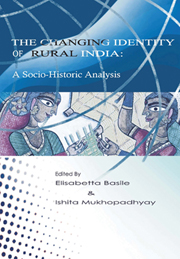Book contents
- Frontmatter
- Contents
- Acronyms and Abbreviations
- About the Authors
- INTRODUCTION
- PART 1 INDIAN RURAL TRANSFORMATIONS
- PART 2 INEQUALITY IN RURAL INDIA
- PART 3 SOCIAL MOVEMENTS AND IDENTITIES
- The Social Context of Politics in Rural West Bengal (1947–92)
- Agrarian Expansion under Colonial Rule and its Impact on a Tribal Economy
- Acting on Institutions to Preserve Agricultural Biodiversity: The Syngenta Controversy in Chhattisgarh
- The Conflicting Opinions of the Colonial Bureaucracy over the Paraiyans Right over ‘Waste’ in late 19th Century Tamil Nadu
- Appendix 1 Socio-Economic Indicators of Rural India
The Conflicting Opinions of the Colonial Bureaucracy over the Paraiyans Right over ‘Waste’ in late 19th Century Tamil Nadu
from PART 3 - SOCIAL MOVEMENTS AND IDENTITIES
Published online by Cambridge University Press: 05 March 2012
- Frontmatter
- Contents
- Acronyms and Abbreviations
- About the Authors
- INTRODUCTION
- PART 1 INDIAN RURAL TRANSFORMATIONS
- PART 2 INEQUALITY IN RURAL INDIA
- PART 3 SOCIAL MOVEMENTS AND IDENTITIES
- The Social Context of Politics in Rural West Bengal (1947–92)
- Agrarian Expansion under Colonial Rule and its Impact on a Tribal Economy
- Acting on Institutions to Preserve Agricultural Biodiversity: The Syngenta Controversy in Chhattisgarh
- The Conflicting Opinions of the Colonial Bureaucracy over the Paraiyans Right over ‘Waste’ in late 19th Century Tamil Nadu
- Appendix 1 Socio-Economic Indicators of Rural India
Summary
In the recent past, non-government agencies in several parts of south India have been active in raising issues related to the landlessness of the Dalit communities. (In the early 1970s, a group of radical intellectuals for the first time employed the term ‘Dalit’ to convey the militancy on the part of certain social categories, who had been regarded as ‘untouchables’ and had been the victims of upper caste domination.) These organizations with the support of civil rights activists have placed demands for the release of bonded labourers, implementation of minimum and equal wages and for the basic rights of Dalit groups. In Tamil Nadu, the nongovernment agencies have emphasized the importance of investigating into the local land records, publicizing the ownership details and exposing the loopholes present in the land ceiling laws. However, such activities have failed to protect the Dalit communities from verbal insults and physical abuses. In course of little more than a decade, the upper caste groups in several districts of Tamil Nadu have been involved in reasserting their claims over the Panchama lands (lands which had been kept reserved for the ex ‘untouchable’ communities, who for several centuries had been denied the privileges of land ownership) which for centuries had been utilized by the ‘untouchable’ agricultural labouring groups for residential purposes. In most cases, with the active connivance of the police officials, they unleashed a reign of terror on the indigent Dalit communities.
- Type
- Chapter
- Information
- The Changing Identity of Rural IndiaA Sociohistoric Analysis, pp. 287 - 312Publisher: Anthem PressPrint publication year: 2009

